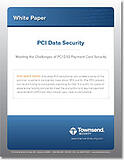DOWNLOAD WHITE PAPER |
Customers moving to a hosting provider or cloud provider are often confused about PCI DSS compliance regulations, and what their responsibilities are in that environment. Some companies feel that they can avoid compliance concerns by moving to a cloud service. Some feel that they are no longer under compliance regulations at all in that environment. I heard this comment just this week:
“I don’t need to worry about compliance because my hosting provider says they are PCI compliant.”
This is dangerously wrong. Let’s sort this out.
First, hosting providers who say they are PCI compliant are usually talking about their own systems, not about yours. Their credit card payment application is PCI compliant, they run the required vulnerability assessments on their payment processing applications, they collect system logs, and so forth. All of these things are required by the hosting or cloud provider for their own systems to be PCI compliant. They aren’t talking about your applications and data.
This does not make you automatically PCI compliant when you use their platforms or applications. You still bear the responsibility for meeting PCI compliance in your applications. Regardless of the hosting or cloud implementation (Infrastructure-as-a-Service, Platform-as-a-Service, Software-as-a-Service, or a hybrid approach), you are always responsible for PCI compliance of your data.
What does the PCI Security Standards Council (PCI SSC) say about cloud environment?
The hosted entity (you) should be fully aware of any and all aspects of the cloud service, including specific system components and security controls, which are not covered by the provider and are therefore the entity’s responsibility to manage and assess.
And,
These challenges may make it impossible for some cloud-based services to operate in a PCI DSS compliant manner. Consequently, the burden for providing proof of PCI DSS compliance for a cloud-based service falls heavily on the cloud provider, and such proof should be accepted (by you) only based on rigorous evidence of adequate controls.
As with all hosted services in scope for PCI DSS, the hosted entity (you) should request sufficient assurance from their cloud provider that the scope of the provider’s PCI DSS review is sufficient, and that all controls relevant to the hosted entity’s environment have been assessed and determined to be PCI DSS compliant.
Simply put, you are responsible for understanding which parts of PCI compliance a cloud vendor can help you with, and which parts they can’t.
There is no cloud implementation that relieves you of the responsibility of protecting your data. See section 4.3 in this PCI guidance.
What does this mean from a practical point of view?
This means that you must meet all of the PCI DSS requirements for your cloud implementation. You may be able to take advantage of some PCI compliant services provided by the hosting or cloud vendor, but you must have the cloud vendor provide you with guidance, documentation, and certification. You are not off the hook for responsibility in these areas.
Please note the chart on page 23 of the PCI cloud guidance. There is no hosting or cloud implementation that covers your data. You are always responsible for protecting your customer’s cardholder data. This means complying with PCI DSS Section 3 requirements to encrypt the data and protect the encryption keys.
There is no magic bullet. You have to do this work.
Living through a data breach is no fun, and I would not wish this experience on anyone. In hosted and cloud environments, ignorance is not bliss.
Stay safe. For more information, download our whitepaper Meet the Challenges of PCI Compliance and learn more about protecting sensitive data to meet PCI compliance requirements.
Patrick

